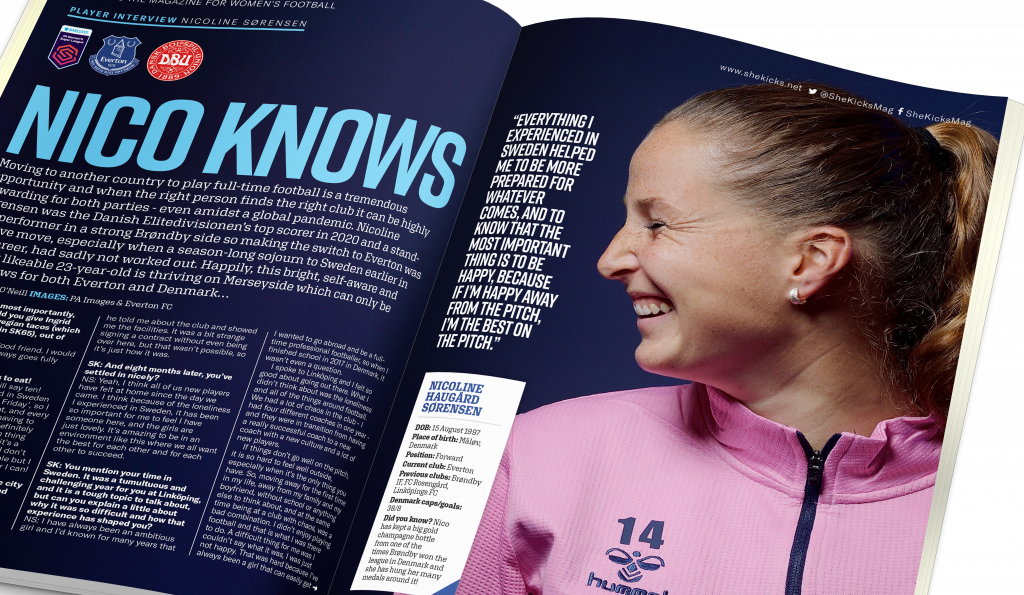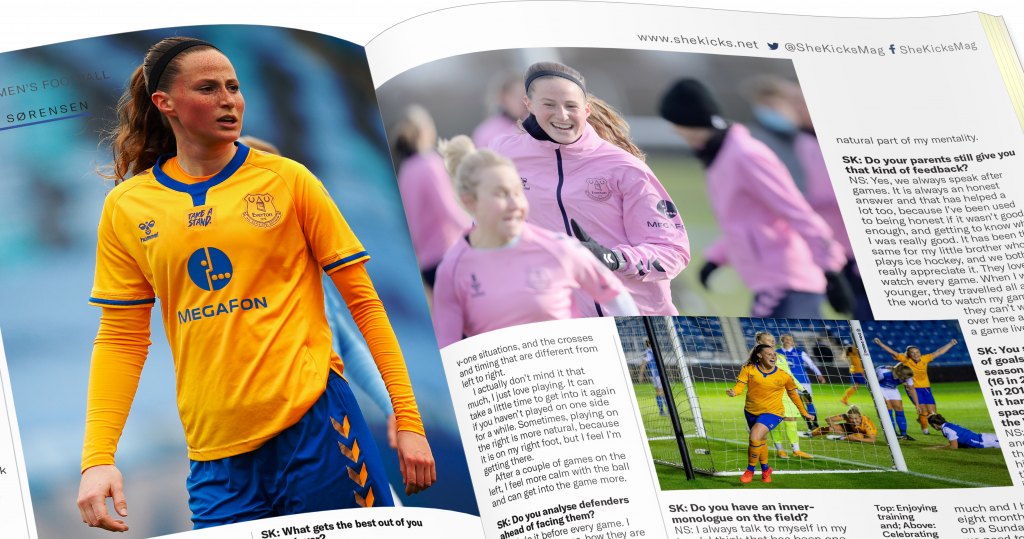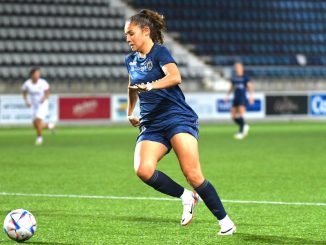Moving to another country to play full-time football is a tremendous opportunity and when the right person finds the right club it can be highly rewarding for both parties – even amidst a global pandemic. Nicoline Sørensen was the Danish Elitedivisionen’s top scorer in 2020 and a stand- out performer in a strong Brøndby side so making the switch to Everton Women was a brave move, especially when a season-long sojourn to Sweden earlier in her career, had sadly not worked out.

Happily, this bright, self-aware and hugely likeable 23-year-old is thriving on Merseyside which can only be good news for both Everton and Denmark…
SK: Firstly, and most importantly, what rating would you give Ingrid Moe Wold’s Norwegian tacos (which she told us about in SK65), out of ten?
NS: Aww, that’s my good friend. I would give her a ten. She always goes fully into all tackles…
SK: No, no, Nico. Tacos to eat!
NS: Ahhh Mexican! I’d still say ten!
It’s funny because I played in Sweden and they always had ‘Taco Friday’, so I already knew of the concept, and every time I ask Moe what she is having to eat, she will say ‘tacos!’ It’s definitely more of a Swedish/Norwegian thing than Danish. As far as I know, it’s a lot of the footballers that do it. I don’t know so much about other people but I like it, so I gladly join in whenever I can!
SK: What did you know about the city of Liverpool before you arrived and what about Everton?
NS: Actually, not very much. But the most important thing for me was the club, and when I spoke to Willie [Kirk], he told me about the club and showed me the facilities. It was a bit strange signing a contract without even being over here, but that wasn’t possible, so it’s just how it was.
SK: And eight months later, you’ve settled in nicely?
NS: Yeah, I think all of us new players have felt at home since the day we came. I think because of the loneliness I experienced in Sweden, it has been
so important for me to feel I have someone here, and the girls are just lovely. It’s amazing to be in an environment like this where we all want the best for each other and for each other to succeed.
SK: You mention your time in Sweden. It was a tumultuous and challenging year for you at Linköping, and it is a tough topic to talk about, but can you explain a little about why it was so difficult and how that experience has shaped you?
NS: I have always been an ambitious girl and I’d known for many years that I wanted to go abroad and be a full- time professional footballer, so when I finished school in 2017 in Denmark, it wasn’t even a question.
I spoke to Linköping and I felt so good about going out there. What I didn’t think about was the loneliness and all of the things around football. We had a lot of chaos in the club – I had four different coaches in one year – and they were in transition from having a really successful coach to a new coach with a new culture and a lot of new players.
If things don’t go well on the pitch, it is so hard to feel well outside, especially when it’s the only thing you have. So, moving away for the first time in my life, away from my family and my boyfriend, without school or anything else to think about, and at the same time being at a club with chaos, was a bad combination.
I didn’t enjoy playing football and that is what I was there to do. A difficult thing for me was I couldn’t say what it was, I was just not happy. That was hard because I’ve always been a girl that can easily get to know why I feel the way I feel, but I couldn’t in that situation. I rang my parents and my boyfriend and talked to them for many hours every night because I needed some company. I had never felt that kind of loneliness.
After a year, I decided to go back to Denmark to see if I could find joy in playing football again. The good thing was, when I came back to my family and boyfriend and back to Brøndby, I played better than I ever did. They were the best two years of my career so far.
Yet, if you asked me today would I do the same in the summer of 2017, I would do it all again. Everyone thinks that living a professional football life is the best and so nice, doing what you love, and of course we are really lucky, but there is another side to it, and it has been important for me to talk about it. Not so people fear it, but because they have to know that it can be like that as well, and also that it is normal to feel that way sometimes.
Everything I experienced in Sweden helped me to be more prepared for whatever comes, and to know that the most important thing is to be happy, because if I’m happy away from the pitch, I’m the best on the pitch. I can’t see myself only as a footballer, because I’m so much more than that.
I have learned so much from it, so I know what I need in my life and what I need from a club and coaches. I could have stayed in Brøndby for the rest of my career if the right club hadn’t come along – I’d tried before – but luckily the opportunity to join Everton came up.
I’m really lucky that my boyfriend is here with me. He can do his work, and due to the pandemic, is able to study online from home. Being in a country far away from friends and family can be a hard situation, but it’s good that we have each other, and Everton feels like a second family.
SK: What gets the best out of you as a player?
NS: I like to be confident and to know that the coach likes me and thinks I’m a good player. Since learning so much about myself in Sweden, my development has just headed in one direction. I think a lot of my progression is down to being more calm. I know myself better and I know that I’m good enough, otherwise, I wouldn’t be here. Then it’s just about the small details: getting to know the coaches, what do they want from me, getting the dialogue started.

SK: You have often operated on the left of the forward line with Everton, but with Denmark, it is mostly the right?
NS: I’ve actually played on both sides. I am right-footed, so I’ve played most on the right-hand side, but the last couple of months, I’ve played on the left-hand side. There are some small details in the one-v-one situations, and the crosses and timing that are different from left to right.
I actually don’t mind it that much, I just love playing. It can take a little time to get into it again if you haven’t played on one side for a while. Sometimes, playing on the right is more natural, because it is on my right foot, but I feel I’m getting there.
After a couple of games on the left, I feel more calm with the ball and can get into the game more.
SK: Do you analyse defenders ahead of facing them?
NS: I do it before every game. I see how they press, how they are on the ball, which foot they pass with, are they aggressive, will they give me time? I always do that, and especially when you are my type of footballer, who likes to run at defenders, that can give me one step ahead.
SK: As you say, you love to run at players, is there a trick or skill you have always practiced, one that is your favourite?
NS: One of the things I’ve developed over the last couple of years, when I’ve played better and better players who are just as fast as me, is my timing and touch. I’m making the difference by using my pace as a weapon and my football brain. My development here has been a process too and I feel like I’m bringing more of my game into Everton now.
SK: Do you have an inner- monologue on the field?
NS: I always talk to myself in my head; I think that has been one of my strengths during my career. I always evaluate myself in every situation and I do it after games and after training. Let’s say I fail in a one-v-one duel, I go back and I am like, ‘Why didn’t I succeed? Was my touch too long, too narrow? Did I take it too late? How can I change it so that the next time in that situation I will succeed. It’s a strength as a person and as a footballer, evaluating myself all of the time. It started really early too because my dad and mom have always talked with me after games about what was bad. I think because we started that early it has become a natural part of my mentality.
SK: Do your parents still give you that kind of feedback?
NS: Yes, we always speak after games. It is always an honest answer and that has helped a lot too, because I’ve been used to being honest if it wasn’t good enough, and getting to know when I was really good. It has been the same for my little brother who plays ice hockey, and we both really appreciate it. They love to watch every game. When I was younger, they travelled all around the world to watch my games, and they can’t wait to get over here and watch a game live.
SK: You scored a lot of goals in your last season in Denmark (16 in 2019-20, 11 in 2018-19) but is it harder to find space and time in the WSL?
NS: Yeah, less time, and player for player, the quality is much higher. In training, the quality of player is really high, too. I have developed so much and I have only been here eight months. The games we play on a Sunday are so competitive, we need to be 100 per cent every time, and that wasn’t the same when I was in Denmark.
SK: Has that helped you with the national team?
NS: Definitely. From the Danish league to the national team was always a big step up, whereas the standard of the WSL is closer so now I’m more used to the tempo when we get into camp.
When we’ve had some easier games, in terms of the Euro qualification, I feel my development has helped me a lot to get success in those kind of games.
SK: You have been part of the Denmark squad for a number of years but more recently became a regular starter?
NS: Yes, I feel more established in the team now and that has been a really big step for me, because I had two-and-a-half to three years where I was only subbed on, and sometimes I wasn’t with the squad. I’ve played much more under our new coach Lars Søndergaard in the past two years, and I feel like we have a really good discussion, and he helps me a lot as well, telling me what I need to focus on to improve my game and be an important player on the national team.
SK: What would you say is the biggest football lesson you have learned in your move to Everton? NS: That training more and harder isn’t always the best thing to do. I’ve always loved training and pushing myself, and probably always done it too much. I’ve struggled with our staff saying ‘that’s enough for today’ or ‘no, you have two days off’.
I remember a season in Brøndby where we had Champions League, cup and league games, and I was playing 90 minutes both Wednesdays and Saturdays. By the last two months of the season, I could barely walk out of bed in the morning, yet I was still doing full training every week.
It has taught me about the balance between training and rest and I feel it has improved my game a lot.
SK: When you are ‘resting’, I guess you are studying. Why engineering?
NS: I’ve always loved subjects like maths, biology and physics, and my dad started his own engineering company many, many years ago, then sold it, though my mom and dad still work in it. It’s an inspiring journey to follow. My dad has always been really innovative, finding solutions to a lot of problems, and so I think it was natural for me.
SK: How many years will your university degree run for?
NS: I think I’m going to double the time, so it will be around seven years. A lot of my studying I actually need to do at the school in Denmark – group work and close collaboration with companies – but I will find a solution. For now, COVID is a positive, in terms of my study, because everything is online. For me, it is important to have a space where I don’t think about football, and I really find that when I study, and I enjoy it.
SK: As finalists in 2017, how exciting was qualifying and the prospect of the upcoming EUROs?
NS: Qualifying for the EUROs was such a big goal for us and qualification had been going on for a couple of years, so it was amazing to get that ticket. The game against Italy was just so great to be a part of. It was probably the best game that we have ever played since I started playing with the national team; it felt like everything came together.
I think it’s helped us that the EUROs were delayed, because we are still a young team, and I think that year can benefit us a lot. Hopefully, the summer of 2022 can be a normal world, with fans coming back into the stadium.
SK: Have you ever asked for someone’s autograph?
NS: After we played the final in the 2017 EUROs, I asked everyone to sign my final shirt. That is still one of my proudest moments of all-time. Even though I wasn’t really a big part of it [the team], I feel like I was a part of it.
SK: Cool! So that is probably your favourite footballing souvenir, too?
NS: Yeah, or my FA Cup Wembley shirt. Going to Wembley was unreal. I remember when we won the semi-final, I was thinking ‘oh nice, we’re going to the final,’ but I didn’t really understand why everyone was speaking about Wembley. I didn’t know how big it is but I finally realised it when I was there! It was amazing.
SK: What is your favourite social media app?
NS: Instagram. I like the part where you can show small things from your everyday life. It’s nice to interact with people and with fans that I haven’t been able to meet yet. I’ve also just started to get to know Twitter, which is really big here in England.
SK: Do you have a bucket list? Tell us one thing on it?
NS: I want to travel and see much more of the world, when I can. Top of my list, and I’ve talked a lot about it with Hayley [Raso], is Australia.
SK: Well you may get to spend a lot of time there in 2023?!
NS: A lot of players on the national team now have not been to a World Cup, so that is a big goal of ours, and a big, big goal of mine.




